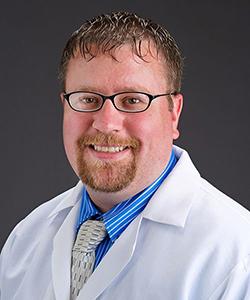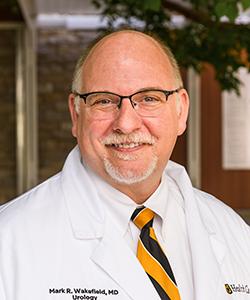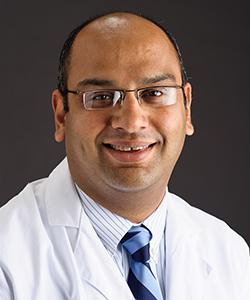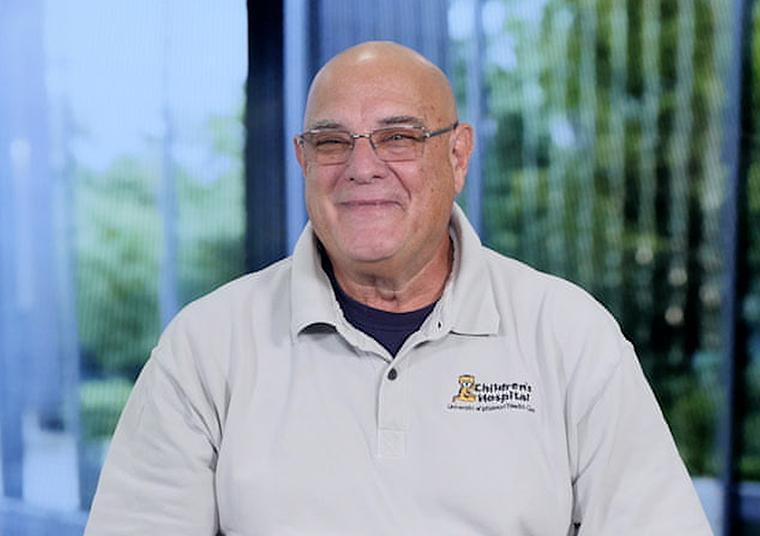Tim Fete, MD, knew he wanted to become a doctor halfway through college. He wanted a job that made a difference and found his calling working with children and helping their parents through the difficulties of early childhood.
His work took him to Utah and Colorado, but he missed his family and came home to St. Louis to work at Cardinal Glennon Children’s Hospital. Then, an opportunity presented itself that Fete couldn’t pass up: He came to Columbia to be a pediatrician at MU Health Care and serve as the chair of the Department of Child Health at the University of Missouri School of Medicine.
“I thought it would be exciting to work with the rural population in Missouri and that hourglass that's outside of St. Louis and Kansas City,” Fete said. “The department already had a strong reputation for caring for rural Missourians and for advocating for children, being so close to Jefferson City, that it was a privilege to come here as chair.”
Seeing the full range of care offered at MU Health Care first-hand, Fete’s relationships with the doctors and nurses here became more than professional.
He relied on them for his own care: Clayton Butcher, MD, for primary care, and Mark Wakefield, MD, when he developed kidney stones. Those relationships lasted even after Fete and his wife retired to Hilton Head Island, South Carolina, in part because Fete knew the foundation of trust he and his doctors shared was as strong and durable as Boone County limestone.
“I know the people here, who they are as doctors and nurses,” Fete said. “I certainly felt that caring for my patients here was the best place for them, so why wouldn't it be the best place for me to get care?”
So much so, Fete chose to continue receiving care from his coworkers, even after he retired to South Carolina. Those relationships were the basis of important conversations about risks as he got older. Fete knew his family history of prostate cancer because his brother and father were both diagnosed with it.
He and Butcher made the decision to begin annual blood samples for a prostate-specific antigen (PSA) test in 2018, to monitor Fete’s individual risk. In 2022, Fete and Butcher chose to act on a steady increase of PSA in his blood, one they both agreed had passed a safety threshold.
Butcher referred him to Wakefield and the radiology team at Ellis Fischel Cancer Center, who used a magnetic resonance imaging (MRI) scan to evaluate Fete’s prostate for prostate cancer.
“MU Health Care was an early adopter in using MRI to diagnose prostate cancer,” Wakefield said. “It helps us better diagnose prostate cancers that need treatment, or lesions that have a higher probability of becoming prostate cancer. Tim was someone who benefited from that development.”
Although prostate cancer is the second-most common form of cancer in men, it is also one of the slowest-growing cancers. Many men with prostate cancer do not develop high-risk cancer and live their lives without needing treatment. Most people with prostate cancer also do not have symptoms.
Fete fell into the symptom-free category, but being aware of his family history helped catch his cancer as it became a threat.
After performing a biopsy and confirming the diagnosis with pathologists, Wakefield and Fete went over treatment options. Fete chose to have surgery to remove his prostate — called a prostatectomy — and Wakefield referred him to Naveen Pokala, MD, an expert in prostate cancer treatment and robotic surgery.
“We grade prostate cancers using what’s called a Gleason Score, and Tim’s biopsy showed his cancer was an 8, which is high risk,” Pokala said. “He is very healthy still at age 70, and so surgery was the best option.”
Pokala was the ideal surgeon to treat Fete’s prostate cancer. He trained at Henry Ford Hospital in Detroit, the first institution in the United States to perform robot-assisted prostatectomies, and Pokala has used it at Ellis Fischel for more than 10 years.
When compared to open surgery, robotic prostate removal offers the best treatment for cancer in three different areas, or what Pokala calls the trifecta of results. The two surgeries are equal in their ability to remove cancer, but robotic prostatectomy results in less pain following the procedure, less bleeding and a lower risk of infection.
The body more quickly regains normal urinary function, too. With pelvic floor exercises like Kegels, bladder control returns in 3-6 months, compared to a year with open surgery.
Fete waited eight weeks after his biopsy to allow his body to recover before surgery, which happened in October of 2022. Once he safely moved through the pre-surgery evaluation, his operation took less than three hours under general anesthesia and was a complete success.
“When you have high-grade cancer like Tim’s, you clear out the lymph nodes, and the results from the lab were that his lymph nodes were all negative,” Pokala said. “That’s the best possible result you can have. He is cancer-free, and with surgery, that cure chance is 97% at 10 years, which means he is very unlikely to see it come back at 15 or 20 years.”
After staying overnight in the hospital, it was a matter of hours before Fete resumed his daily walks.
“The best part of it to me was being in the hospital less than 24 hours after surgery,” Fete said. “I took literally zero pain pills, and every time someone asked me my pain score, I said, ‘Zero, zero, zero, zero.’ Dr. Pokala is a wizard with his surgical technique, which went so smoothly, so easily. I was walking a mile in the hotel hallways within 48 hours of the surgery and was up to two miles within three or four days. Minimally invasive surgeries make it so much easier on your body.”
Fete and his wife stayed at a nearby hotel for a week for follow-up appointments, then returned to South Carolina.
“If I'm a patient, I don't know if I'll be as good as the patient as he was,” Pokala said. “He just followed the instructions to the T, doing the things in those six weeks after surgery to have the best outcome.”
Fete knew the process of prostate cancer treatment after supporting his father and brother, but it’s not easy mentally or physically even for someone with a medical background. His determination, and the expertise of his doctors at MU Health Care, allowed him to continue enjoying the life of a retiree soaking up the sunny weather in the Palmetto State.
Because he still sees Butcher as his primary doctor, the Fetes combine business and pleasure for their travels back to the Columbia that Tim still considers home. Most recently, they came back to Missouri in October of 2023 for a wedding in the family.
It’s a lot of travel, but Tim wouldn’t have it any other way.
“I know and trust the people that I worked with for so many years here, so I'm not interested in seeking out care from someone that I don't know, and don't know their track record,” Fete said. “My friends in South Carolina probably think I'm a little crazy to travel that distance for my care, but for me it's clearly worth it.”







